A Dialog Sermon by Ben and Maggie Roe
Arvada United Methodist Church, 7/2/17
[Maggie] Ben and I have attended several General Conferences, the global gathering of United Methodists, over the years, usually to help with the Reconciling Ministries Network. I'll always remember the train ride from the Dallas-Fort Worth Airport into Fort Worth. A woman sitting across from us heard us talking, and asked us where were from and what we were going to do in Fort Worth. We told her we were going to attend the world-wide gathering of United Methodists called General Conference. She said, "I know about Methodists. They care about people." We have a reputation.
[Ben] And that is due to our theology and our practice. You see, John Wesley, our founder, was a priest in the Church of England in 1728-1791, and had an experience of God's love that changed his life. He struggled with his ministry, experiencing failure in Georgia during a mission trip, and sought out the company of Moravian faithful. In a study group one night in 1738 he was listening to the reading of Luther's Preface to Romans and suddenly found his heart "strangely warmed" as he put it, and felt deeply loved, forgiven, and accepted by God though Jesus.
[Maggie] It is this kind of personal experience of God's grace that shaped his understanding that grace is all around us, even before we know it. He believed that God's grace gave us the desire to seek out God and the deeper meanings of life. He called this “prevenient” or “preceding” or “enabling” grace.
[Ben] Wesley said that God’s grace was universal: that God’s love was free in all and free for all: It does not depend on any power or merit we might have. This is the first step in a journey of salvation, of wholeness of relationship with God.
[Ben] So in prevenient grace, God brings us to a recognition of how far we have to go, and how we have been messing up our journey. At this point, all pretense has been torn away and we seek God’s forgiveness. When one consciously accepts God’s offer and claims that forgiveness, one is justified, made right with, or reconciled with God. One moves from what might be called “servant faith” to the faith of a son or daughter. So as one comes to know God, and begins to experience a relationship with God, there comes a point of reconciliation or acknowledgment of one's need for God. This is where one experiences what has traditionally been called “saving or justifying grace.”
[Maggie] One of the most distinctive parts of Wesleyan belief is a third type of grace. Wesley saw all of life as a journey of growing more and more in grace, and called this “sanctifying” grace or holiness, which deepens as one's walk with God through Christ grows.
[Maggie] In this, he wanted to express the promise of the great transformation of life that can happen as one grows in grace. The phrase “going on to perfection” is used to mean the active seeking after holiness that one does after justification. This means that one develops a continuing relationship with Christ and God, even though the human expression of it is imperfect. Methodist theologian, Colin Williams, has explained it something like this: “The Christian can enter into such fullness of faith that the heart is aflame with the constant presence of Christ and [one's] whole consciousness is [filled with] God’s love. ...This does not mean that there is no deviation from the will of God. In fact, the ‘perfect’ Christian, because of this deeper relationship to Christ, becomes more and more aware of [one's] moral, psychological, and intellectual imperfections.”
[Ben] As a result, a Methodist Christian expresses grace, through service and witness. So the life of United Methodists is at least two sided: personal spiritual growth in grace, and service in social action and justice in the world, which grows out of that grace.
[Ben] Wesley's emphasis on personal spiritual growth and social action seems to us to match the words of the prophet Micah, to love justice and walk humbly with our God.
[Maggie] So the combination of social service and justice-seeking, and spiritual growth and inspiration, are what I think is the best part of being a United Methodist.
[Maggie] Hospitality is grace, and we experienced that the first Sunday we attended here, before you knew us. Melanie and David MeyerAnderson and Joel and Ruby welcomed us and took us around, telling us about who you were as a church and inviting us back. We felt welcomed. I hope you have felt that kind of welcome, too.
[Ben] As United Methodists, we speak of “the Connection”--the fact that we are the church in connection with each other. In fact, it is the regional church, the “annual conference,” that is the basic unit of United Methodism. The term “annual conference” is also used for the annual meeting of all pastors and lay representatives of all churches. 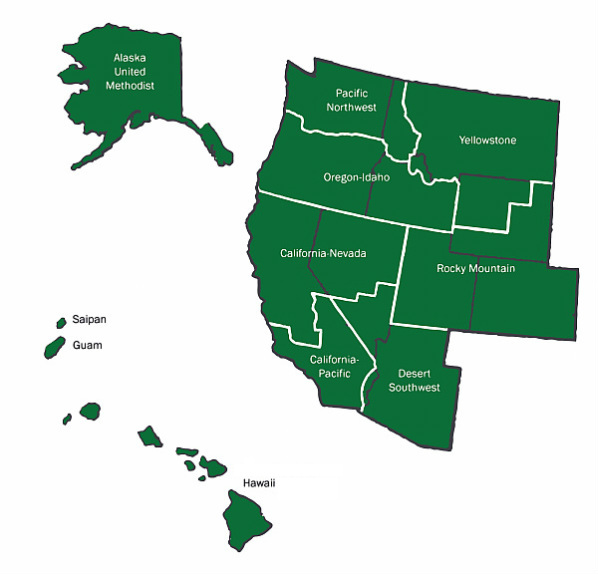 In our case the “annual conference” currently includes all of Colorado and Utah, and most of Wyoming—and in the near future we will join the United Methodists of the rest of Wyoming and Montana, to become a new Annual Conference, probably called “Mountain Sky Annual Conference”!
In our case the “annual conference” currently includes all of Colorado and Utah, and most of Wyoming—and in the near future we will join the United Methodists of the rest of Wyoming and Montana, to become a new Annual Conference, probably called “Mountain Sky Annual Conference”!
[Ben] Our annual conference is a part of a larger geographical area called the Western Jurisdiction, which stretches from the eastern plains of Colorado to the islands of Guam and Saipan in the Pacific.
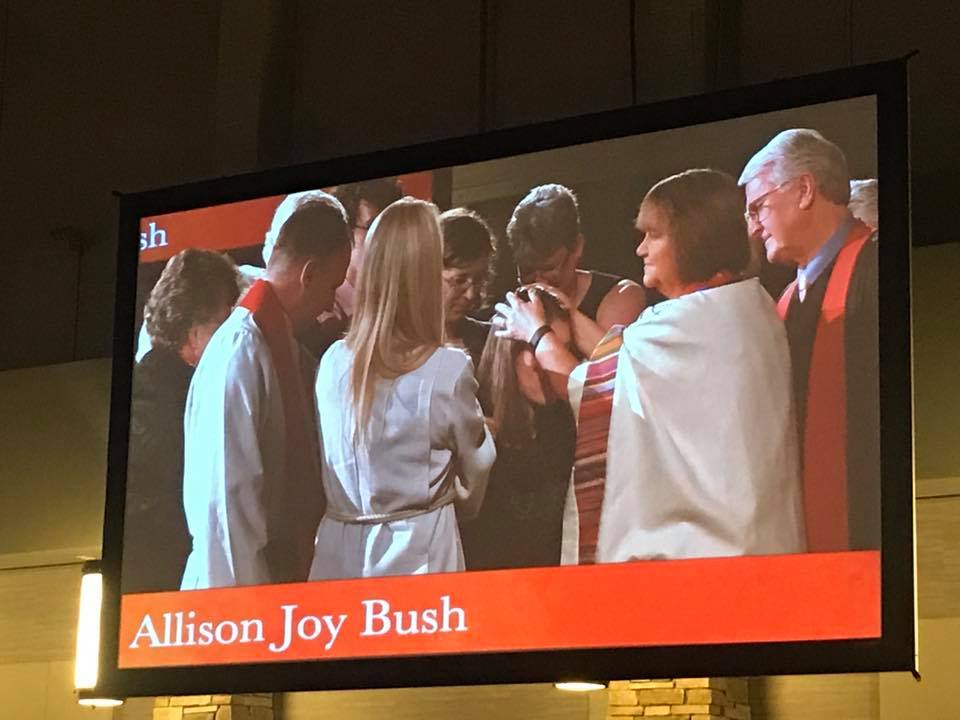 [Maggie] It is the annual conference that examines and confirms those who feel a call to ministry, and then ordains and matches them with the various churches and ministry settings. How that works is that pastors and their immediate supervisors, the district superintendents (in our case, Rev. Paul Kottke), the bishop, and the local church committee, that is the “personnel” committee, the “Staff-Parish Relations Comittee,” all communicate and work together to match up pastors and churches. That's the process we are experiencing right now in the change in pastors, from Rusty and Valerie, to Eric and Stephanie.
[Maggie] It is the annual conference that examines and confirms those who feel a call to ministry, and then ordains and matches them with the various churches and ministry settings. How that works is that pastors and their immediate supervisors, the district superintendents (in our case, Rev. Paul Kottke), the bishop, and the local church committee, that is the “personnel” committee, the “Staff-Parish Relations Comittee,” all communicate and work together to match up pastors and churches. That's the process we are experiencing right now in the change in pastors, from Rusty and Valerie, to Eric and Stephanie.
[Ben] At this annual conference, we began a four-year focus on Living into Beloved Community, referring to Dr. Martin Luther King's vision of a world where all people share in the wealth of the earth. This year w e looked at the line from Matthew 25, where Jesus is talking about a final reckoning with God: for I was hungry and you gave me food, thirsty and you gave me drink. Our breakout sessions looked at various parts of the need for sustainable food and clean water for all.
e looked at the line from Matthew 25, where Jesus is talking about a final reckoning with God: for I was hungry and you gave me food, thirsty and you gave me drink. Our breakout sessions looked at various parts of the need for sustainable food and clean water for all.
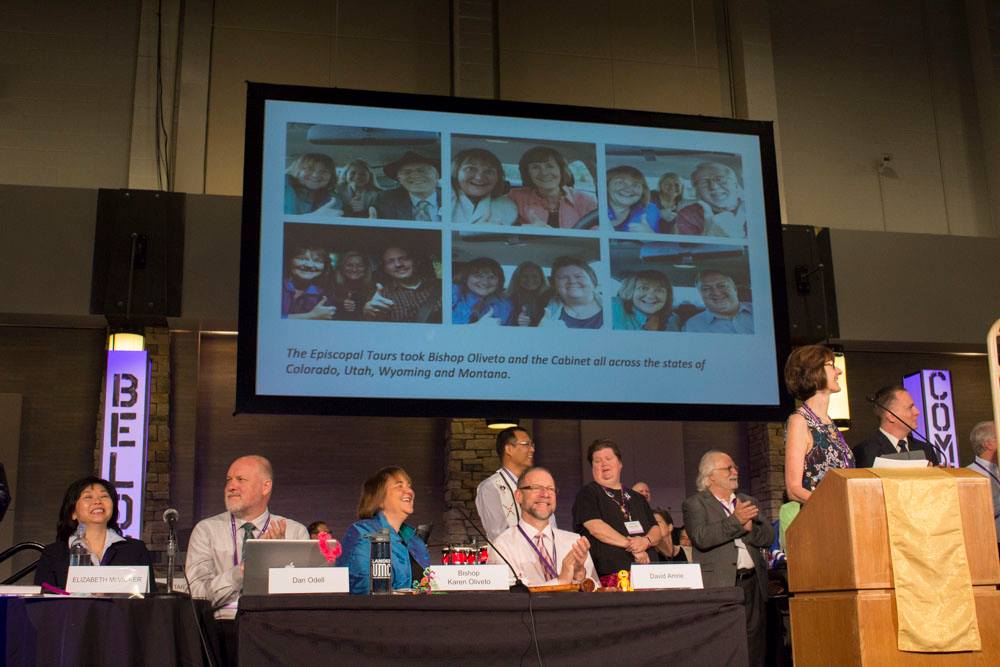 [Maggie] Our new Bishop Karen Oliveto, during her 8,000—yes, 8000!--mile tour of her new assignment to the Mountain Sky Area, was struck by how many of the churches she visited were doing something about hunger through free meals and food pantries and bringing people together, because one thing about poverty is, it isolates us. And we here at AUMC provide a community meal once a week.
[Maggie] Our new Bishop Karen Oliveto, during her 8,000—yes, 8000!--mile tour of her new assignment to the Mountain Sky Area, was struck by how many of the churches she visited were doing something about hunger through free meals and food pantries and bringing people together, because one thing about poverty is, it isolates us. And we here at AUMC provide a community meal once a week.
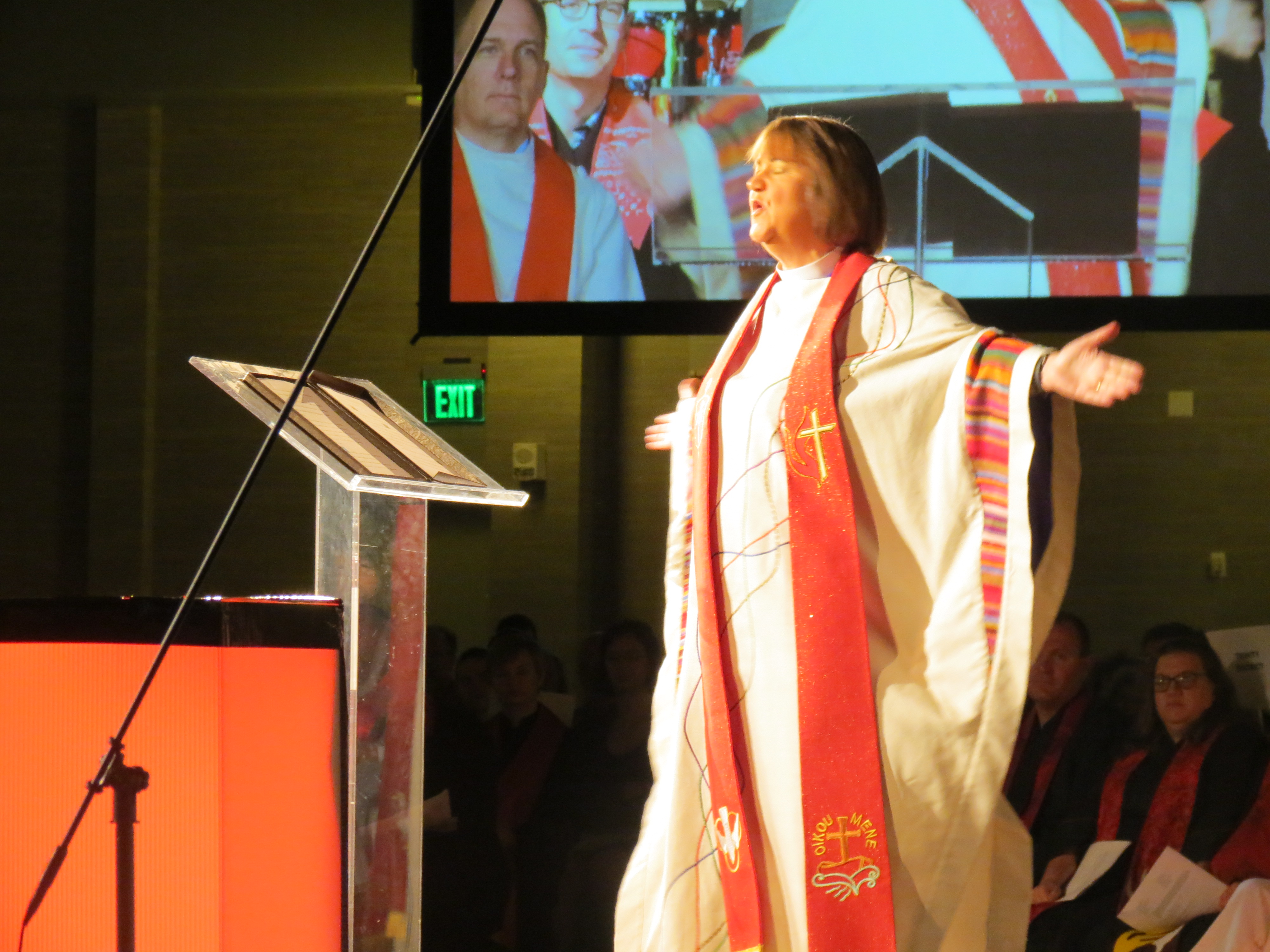
 some worked
some worked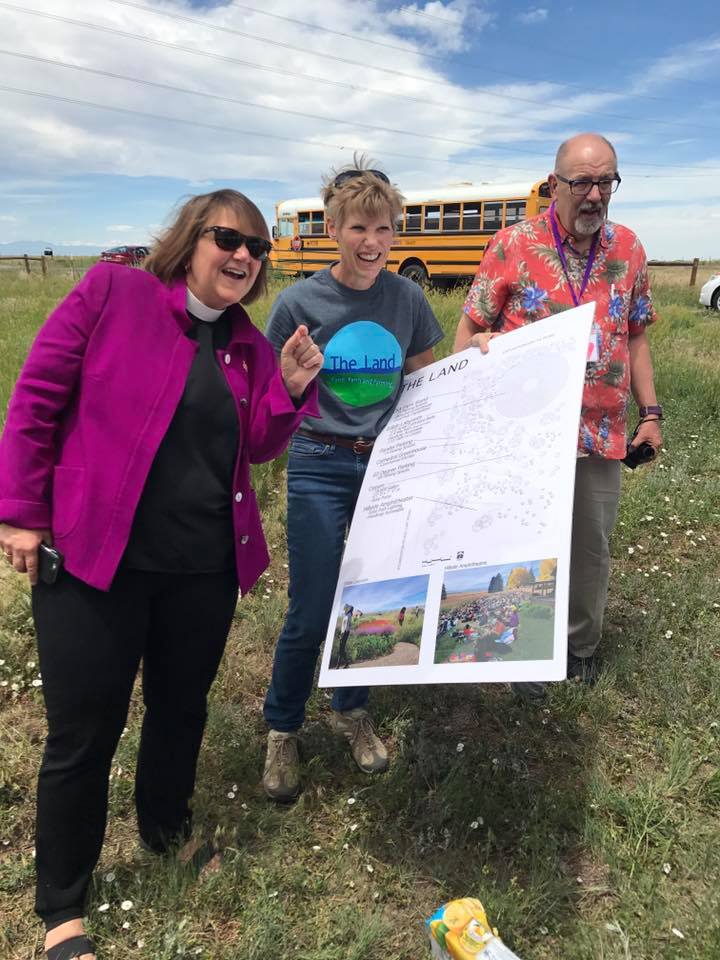 at a food bank; and some visited the site of a new church which will approach its land and environment in new ways.
at a food bank; and some visited the site of a new church which will approach its land and environment in new ways.
[Ben] In a session with the laity on hunger and food insecurity, we heard Dr. Robin Dickinson, a physician in Englewood speak of her becoming suddenly “food insecure” because of two severe strokes. 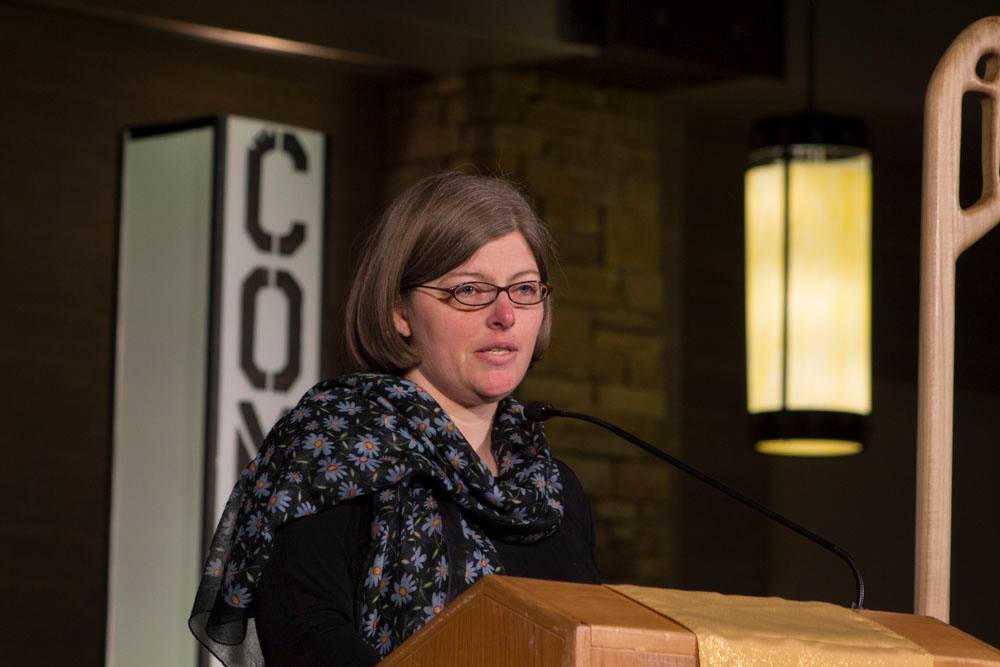 She was in her 30s, lost her job and found herself and her family needing food assistance just to have enough to eat. She talked about how nearly one in 8 families in Colorado live in poverty and how excited her kids were to go to the grocery store after surviving on oatmeal, potatoes, and rice for months. She talked about the stereotypes and unhelpful advice. “So why doesn't your husband go to work?” She talked about how the cost of childcare would be more than her husband would make, and how it was cheaper for him to do the childcare. "Hunger means giving up health, giving up choice, feeling lousy, saying no to your kids, and when you're hungry, you can't think about the bigger things … You're worrying about how to get food on the table and it just stops everything," she said. If you think about it, many of us are only one, two, or three monthly paychecks away from poverty.
She was in her 30s, lost her job and found herself and her family needing food assistance just to have enough to eat. She talked about how nearly one in 8 families in Colorado live in poverty and how excited her kids were to go to the grocery store after surviving on oatmeal, potatoes, and rice for months. She talked about the stereotypes and unhelpful advice. “So why doesn't your husband go to work?” She talked about how the cost of childcare would be more than her husband would make, and how it was cheaper for him to do the childcare. "Hunger means giving up health, giving up choice, feeling lousy, saying no to your kids, and when you're hungry, you can't think about the bigger things … You're worrying about how to get food on the table and it just stops everything," she said. If you think about it, many of us are only one, two, or three monthly paychecks away from poverty.
[Maggie] So, at Annual Conference, we experienced grace and service, the two emphases of being United Methodist.
[Maggie] We mentioned the Western Jurisdiction earlier. The Jurisdictions elect bishops, and our Western Jurisdiction last July elected 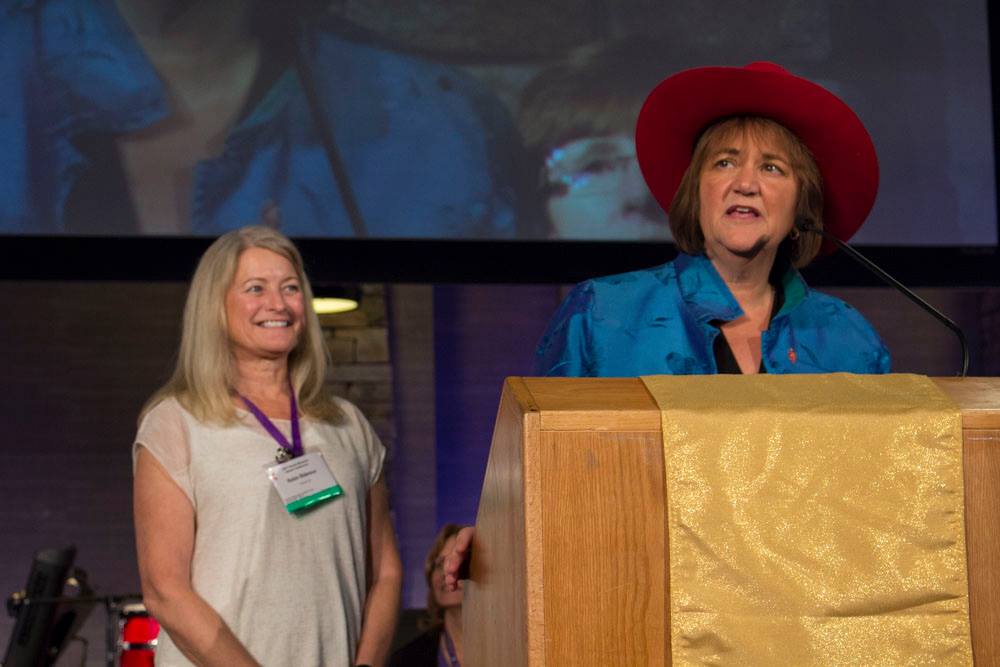 Rev. Karen Oliveto, then pastor of the 12,000-member Glide UMC in San Francisco. She is the first bishop to identify herself publicly as gay (though we have had others), and is married to her spouse Robin Ridenour, a deaconess in the UMC. She was elected by representatives elected by the annual conferences of the West, who carefully and prayerfully considered the qualifications of all of those nominated. The election and assignment to our episcopal area has caused some controversy as you may know, which has led to the bishops of the West issuing a statement and video supporting her leadership.
Rev. Karen Oliveto, then pastor of the 12,000-member Glide UMC in San Francisco. She is the first bishop to identify herself publicly as gay (though we have had others), and is married to her spouse Robin Ridenour, a deaconess in the UMC. She was elected by representatives elected by the annual conferences of the West, who carefully and prayerfully considered the qualifications of all of those nominated. The election and assignment to our episcopal area has caused some controversy as you may know, which has led to the bishops of the West issuing a statement and video supporting her leadership.
 [Maggie] At this year's Annual Conference gathering, I presented a short “point of personal privilege” praising the statement and suggesting people read or view it. One of the things they said in the statement was, “We the people called United Methodist in the Western Jurisdiction witness daily the gifts and reflections of God’s grace in LGBTQ persons who faithfully serve among us as lay leaders, pastors, district superintendents, and now, as a bishop.”
[Maggie] At this year's Annual Conference gathering, I presented a short “point of personal privilege” praising the statement and suggesting people read or view it. One of the things they said in the statement was, “We the people called United Methodist in the Western Jurisdiction witness daily the gifts and reflections of God’s grace in LGBTQ persons who faithfully serve among us as lay leaders, pastors, district superintendents, and now, as a bishop.”
[Ben] As many of you may know, for 44 years the UMC has declared the “practice” of “homosexuality” to be incompatible with Christian teaching. But for gay, lesbian, and bisexual persons, the attraction and love towards persons of their own gender is experienced as a part of who we are, not just some “practice” or behavior. So for more than four decades, gay and lesbian persons have experienced the church as officially unwelcoming. However--and this is important--we give thanks that this congregation has in a number of ways welcomed GLBTQ persons as members and leaders, and that is an important reason we have joined with you.
[Maggie] For nearly 40 years, we have been part of the movement to help move the global United Methodist Church to a more welcoming and reconciling stance towards those who find themselves attracted to persons of their own gender. A year ago, at the global General Conference meeting in Portland, tensions were so high around the disagreement over sexuality that a commission was asked for, to help the church move forward. The results of that commission will be announced sometime next year, and will lead into a special general conference session in 2019 to decide how we as a denomination will deal with sexuality.
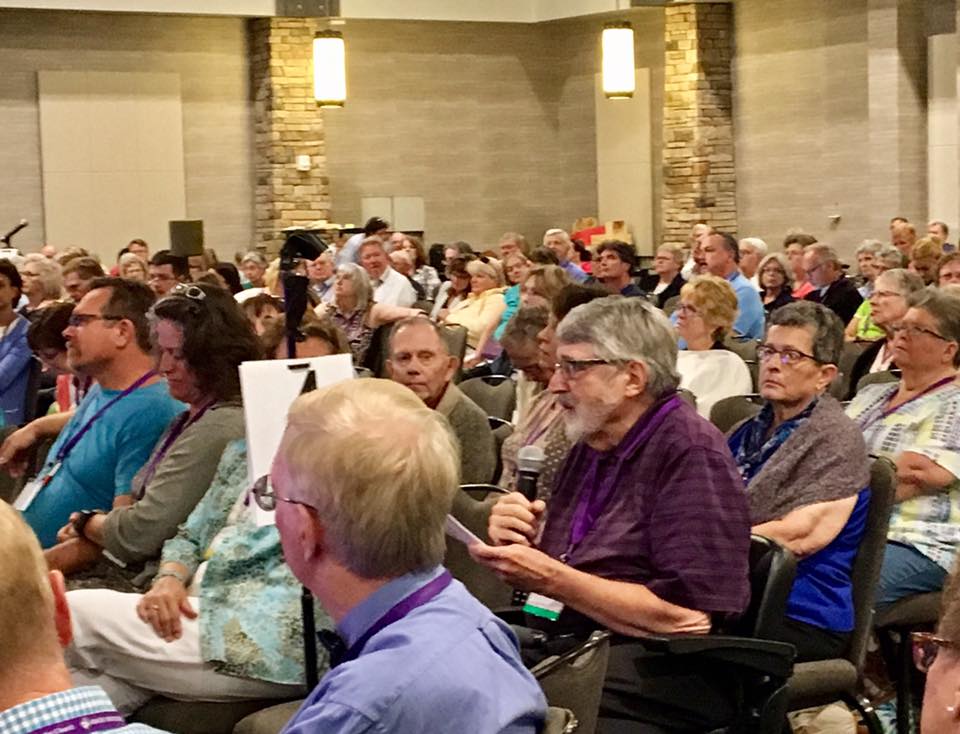 [Ben] At the annual conference, I gave a short speech, another “point of personal privilege,” asking the bishops of the West to call a special Jurisdictional conference prior to that special session to plan how the West, with our unique demographics and mission priorities, might respond to the report from the Commission.
[Ben] At the annual conference, I gave a short speech, another “point of personal privilege,” asking the bishops of the West to call a special Jurisdictional conference prior to that special session to plan how the West, with our unique demographics and mission priorities, might respond to the report from the Commission.
[Ben] Why all the controversy? Well, it's about sexuality, and that is usually an uncomfortable and deeply personal part of our lives as human beings. We've heard one person say that it's easier for many people to talk about their finances than to talk about their sexuality. And it's about a sexuality that is not experienced by most people, so it feels unusual to many. Most studies put the incidence of exclusive same-gender orientation at between 5 and 10 percent.
[Ben] I have studied human sexuality and taught it in a community college, and together, Maggie and I have led human sexuality workshops for youth and older adults.
[Ben] Our 21st century scientific understandings of sexuality show it to be much more complex than just the binary sexes of male and female and binary genders of man and woman. So far, we know that there are six biological markers for sexual differentiation: chromosomes, hormones, brain structures, external reproductive organs, internal and external reproductive structures and tissues—and all of them have a continuum of characteristics. And this all underlies the continua of gender and sexual orientation. Cross-cultural studies show that some cultures have recognized more than two genders as well. So, from this perspective, it's almost as if the use of the very word “homosexual” is nearly meaningless in the face of this complexity.
[Maggie] But we do not need to fear this complexity, because we have some thoughts from scripture that can help. One place is in the letter of Paul to the Galatians. They were arguing over who could be considered in and who could be considered outside of the faith. Paul's answer can be summed up in a couple of verses: "there is neither Jew nor Greek, Slave nor Free, Male nor Female, for all are one in Christ Jesus." The old distinctions fall away, and we are all one in Christ, he says. So looked at from this perspective, our long fight over homosexuality is pretty foolish. 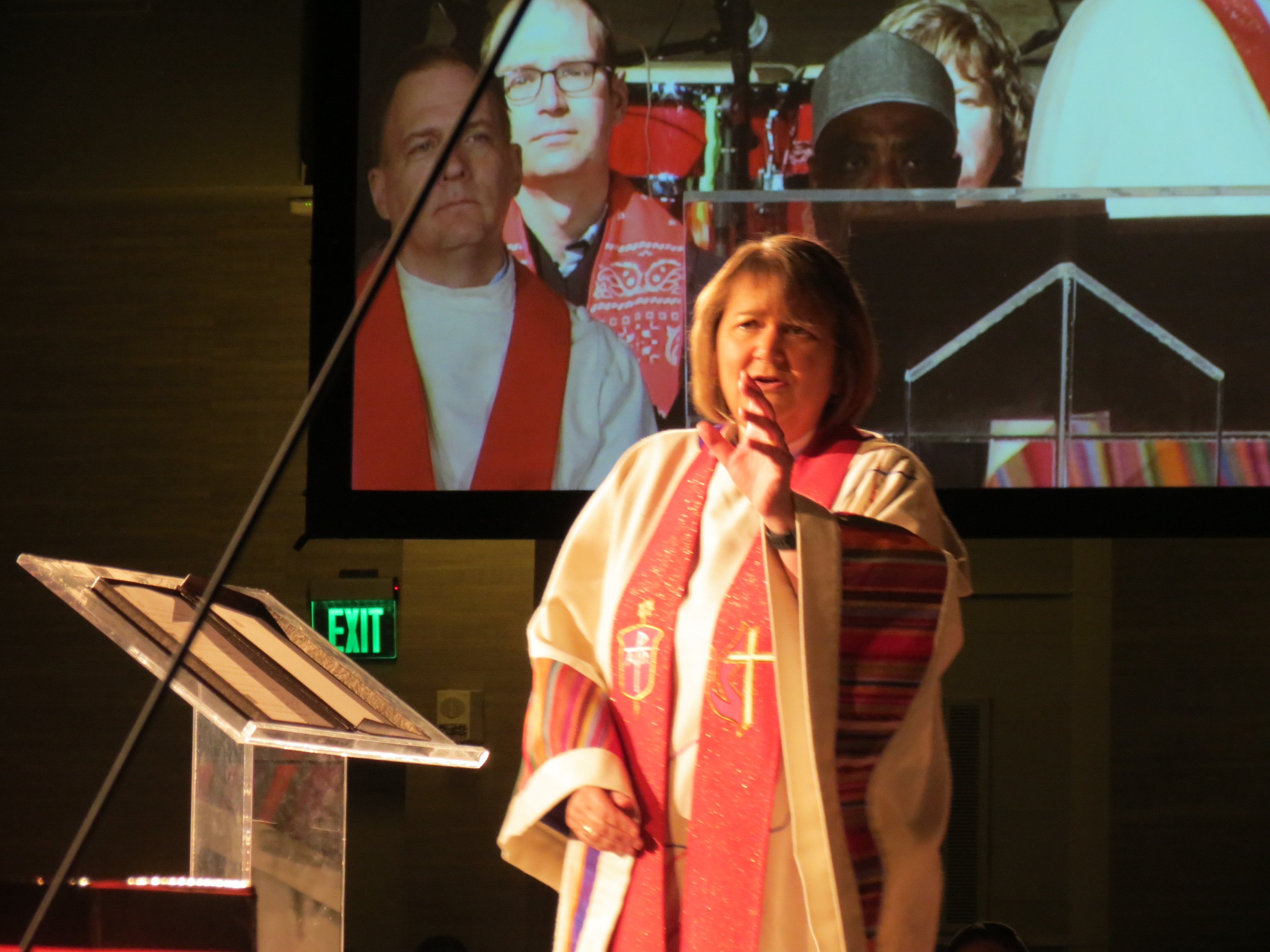
[Ben] Theologian and ethicist James B. Nelson, in his book “Embodiment: An Approach to Sexuality and Christian Theology,” said that “sexuality is a sign, a symbol, and a means of our call to communication and communion.” In other words, it is about far more than just physical activity, but about the call to each of us to be in communication and communion with others. Put another way, sexual orientation is about much more than what happens sexually, but about personal identity and interpersonal loving.
[Ben] The Methodist Episcopal Church was founded at Christmas, 1784, in Baltimore, eight years after the Declaration of Independence on July 4, 1776, 241 years ago Tuesday. It formed a church loosely patterned after the developing U.S. constitution. So, we are called by John Wesley and Methodists since, then into Connection with each other for growth in grace and faith, and for service to our world. As our denominational mission statement says, “The mission of the Church is to make disciples of Jesus Christ for the transformation of the world.”
[Maggie] And we are called to Beloved Community and communion with each other. Thanks be to God!

